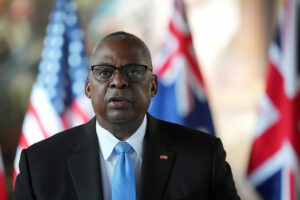US Defense Secretary Austin to visit Manila next week to explore deeper security ties
US DEFENSE SECRETARY Lloyd Austin III will meet with his Philippine counterpart in Manila next week to explore deeper security ties and ensure peace and stability in the Indo-Pacific region, according to the US Department of Defense.

By John Victor D. Ordoñez, Reporter
US DEFENSE SECRETARY Lloyd Austin III will meet with his Philippine counterpart in Manila next week to explore deeper security ties and ensure peace and stability in the Indo-Pacific region, according to the US Department of Defense.
“Secretary Austin will make his fourth visit to the Philippines, where he will advance security objectives with Philippine leaders and meet with US and Philippine forces,” it said in a statement on Wednesday.
The US Defense chief will also meet with other officials at the Association of Southeast Asian Nations Defense Ministers’ Meeting in Laos on Nov. 21.
Mr. Austin’s trip seeks to build on “unprecedented cooperation with like-minded countries to strengthen regional security,” the US agency said. He is also set to visit Australia, Laos and Fiji to tackle regional security issues.
“Mr. Austin has a lot on his hands, especially since now that it is clear there will be no Democrat continuity in the White House,” Hansley A. Juliano, who teaches political science at the Ateneo de Manila University said in a Facebook Messenger chat. “His policies are at high risk of reversal by whoever succeeds him.”
“It is in his interest (as well as the US) to assure the Philippine government under President Ferdinand R. Marcos, Jr. that their commitments to their defense of the West Philippine Sea will not waver even with the transition to a second Trump administration,” he added.
Philippine President Ferdinand R. Marcos, Jr. on Monday told reporters that ties between both countries would not change under a Donald J. Trump presidency.
The US is the Philippines’ major security partner, with a 1951 Mutual Defense treaty compelling both nations to defend each other in case of an armed attack.
Under President Joseph R. Biden, Washington reiterated that the treaty covers any attacks on Philippine vessels, personnel and other assets in the South China Sea and anywhere in the Pacific.
In April, Republican Senator Bill Hagerty and Democrat Senator Tim Kaine pushed a bill that increased US military aid to the Philippines to $500 million from $40 million over five fiscal years through 2029.
“Our national security has always been anchored on the ironclad belief that the US will fulfill the Mutual Defense Treaty, and will continue to be in the foreseeable future,” Michael Henry Ll. Yusingco, a fellow at the Ateneo de Manila University Policy Center, said in a Facebook Messenger chat.
“Given Trump’s unpredictability and ‘America First’ mindset, maybe the Philippines should be prepared in case the US does not meet its obligations under the Mutual Defense Treaty.”
Last year, the Philippines gave the US access to four more military bases under their 2015 Enhanced Defense Cooperation Agreement.
Philippine Defense Secretary Gilberto Eduardo Gerardo “Gibo” C. Teodoro, Jr. on Tuesday said China is putting greater pressure on the Philippines to cede its sovereign rights in the South China Sea.
China and the Philippines have sparred repeatedly this year over disputed areas of the South China Sea, including the Scarborough Shoal, one of Asia’s most contested features.
Beijing claims almost the entire South China Sea, a conduit for more than $3 trillion of annual ship-borne commerce. The Permanent Court of Arbitration in 2016 said China’s claims had no legal basis, a ruling Beijing rejects.
“These engagements will drive ongoing efforts to modernize our alliances and partnerships toward our shared vision for a free and open Indo-Pacific,” the US Defense department said.
Also on Wednesday, Foreign Affairs Spokesperson Ma. Teresita C. Daza told reporters via WhatsApp the agency had summoned Chinese Ambassador Huang Xilian to deliver the Philippines’ protest over China’s drawing of baselines around Scarborough Shoal on Nov. 10.
“The… baselines infringe upon Philippine sovereignty and contravene international law, particularly the 1982 UN Convention on the Law of the Sea and the 2016 arbitral award,” she said. “The… baselines have no legal basis and are not binding on the Philippines.”












